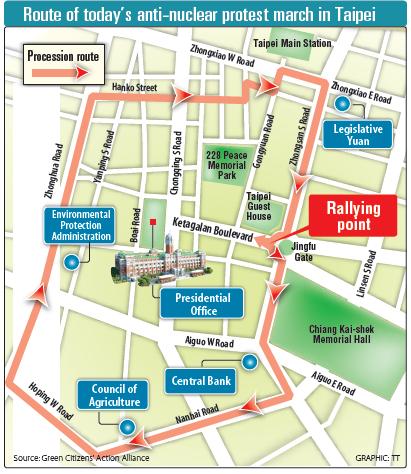The Taiwan Environmental Protection Union yesterday criticized the Chinese Nationalist Party’s (KMT) question for a proposed referendum on halting the construction of the Fourth Nuclear Power Plant, saying the text showed that the party was exploiting the shortcomings of the Referendum Act (公民投票法) to ensure construction continues.
The wording of the proposal, which was unveiled on Thursday, says: “Do you agree that the construction of the Fourth Nuclear Power Plant should be halted and that it not become operational?” (你是否同意核四廠停止興建不得運轉).
National Taiwan University professor Shih Hsin-min (施信民) said yesterday that the ruling party is trying to use the requirement that states that at least 50 percent of voters must submit ballots for a referendum to be valid to veto the proposal to halt construction of the nuclear power plant.

“They [the KMT] were really wearing their hearts on their sleeves — which say: ‘Let the construction continue,’” said Shih, who is also the president of the Taiwan Environmental Protection Union.
He said the government has always supported the construction of the power plant ever since it decided to resume the project on Feb. 14, 2001, adding that position has recently been reiterated by both President Ma Ying-jeou (馬英九) and Premier Jiang Yi-huah (江宜樺).
“They should ask if the public agree that construction of the Fourth Nuclear Power Plant be continued and that it become operational,” Shih said. “That would be a real referendum on government policy.”
Lai Chen-chang (賴振昌), president of the National Taipei College of Business, said the nation would pay a heavy price if a nuclear disaster strikes, no matter how low the chances of it happening. He said not only this generation, but the next, would continue to pay the price, adding citing the example of the Chernobyl nuclear disaster.
“An incorrect government policy is worse than a corrupt government,” Lai said. “The Ma administration has tried to explain its policy by pointing out the costs, but it has ignored the costs that the nation would have to pay for a nuclear disaster.”
National Taipei University economics professor Wang To-far (王塗發) said that the KMT’s proposal completely downplays the negatives of nuclear energy.
“What we are facing is an evil, cold-blooded and shameless government,” Wang said. “They said what happened at [the] Fukushima [Dai-ichi nuclear power plant in Japan in 2011] was mainly the result of human error, as if we are running safe nuclear power plants. Haven’t we learned the lesson of Fukushima?”
National Chiao Tung University civil engineering professor Liou Gin-show (劉俊秀) said that those living within a 30km radius of the Fukushima Dai-ichi nuclear power plant had to evacuate after the nuclear accident there. Were the same rule to apply here, 7 million people would have to be evacuated in the event of a disaster, he said.
“The rule here is 8km. Can they even do that?” Liou asked.
With anti-nuclear protest marches due to take place nationwide today, the union said more academics should come out and support the cause.
According to the Green Citizens’ Action Alliance, the civic group that initiated today’s protests, more than 22,000 people have sent text messages endorsing the movement to abolish nuclear power and it estimated that the march in Taipei would draw more than 30,000 people.
Additional reporting by CNA

An essay competition jointly organized by a local writing society and a publisher affiliated with the Chinese Communist Party (CCP) might have contravened the Act Governing Relations Between the People of the Taiwan Area and the Mainland Area (臺灣地區與大陸地區人民關係條例), the Mainland Affairs Council (MAC) said on Thursday. “In this case, the partner organization is clearly an agency under the CCP’s Fujian Provincial Committee,” MAC Deputy Minister and spokesperson Liang Wen-chieh (梁文傑) said at a news briefing in Taipei. “It also involves bringing Taiwanese students to China with all-expenses-paid arrangements to attend award ceremonies and camps,” Liang said. Those two “characteristics” are typically sufficient

A magnitude 5.9 earthquake that struck about 33km off the coast of Hualien City was the "main shock" in a series of quakes in the area, with aftershocks expected over the next three days, the Central Weather Administration (CWA) said yesterday. Prior to the magnitude 5.9 quake shaking most of Taiwan at 6:53pm yesterday, six other earthquakes stronger than a magnitude of 4, starting with a magnitude 5.5 quake at 6:09pm, occurred in the area. CWA Seismological Center Director Wu Chien-fu (吳健富) confirmed that the quakes were all part of the same series and that the magnitude 5.5 temblor was

The brilliant blue waters, thick foliage and bucolic atmosphere on this seemingly idyllic archipelago deep in the Pacific Ocean belie the key role it now plays in a titanic geopolitical struggle. Palau is again on the front line as China, and the US and its allies prepare their forces in an intensifying contest for control over the Asia-Pacific region. The democratic nation of just 17,000 people hosts US-controlled airstrips and soon-to-be-completed radar installations that the US military describes as “critical” to monitoring vast swathes of water and airspace. It is also a key piece of the second island chain, a string of

The Central Weather Administration has issued a heat alert for southeastern Taiwan, warning of temperatures as high as 36°C today, while alerting some coastal areas of strong winds later in the day. Kaohsiung’s Neimen District (內門) and Pingtung County’s Neipu Township (內埔) are under an orange heat alert, which warns of temperatures as high as 36°C for three consecutive days, the CWA said, citing southwest winds. The heat would also extend to Tainan’s Nansi (楠西) and Yujing (玉井) districts, as well as Pingtung’s Gaoshu (高樹), Yanpu (鹽埔) and Majia (瑪家) townships, it said, forecasting highs of up to 36°C in those areas